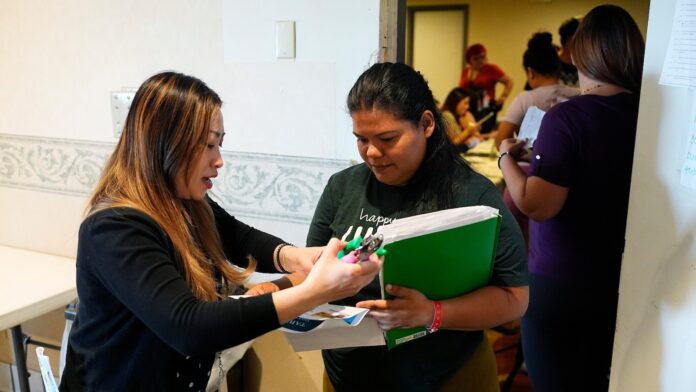DENVER — In a Denver hotel conference room Monday, Dallenis Martinez joined hundreds of other migrants at orientation for the city’s new, ambitious migrant assistance program, which includes six months of apartment stays and intensive job preparation for those who cannot yet legally work.
It’s a reversal of strategies used by Denver, New York City and Chicago as the cities scrambled to support thousands of migrants and cut budgets. The largely improvised support strategies include shelter stays lasting days to weeks or bus tickets to send migrants elsewhere.
Now Martinez, 28, and her two young children, along with about 650 others in Denver, are getting an apartment with six months’ rent, food and utilities, a free computer, a prepaid cell phone and Metro bus passes. .
Next, the city, in partnership with several nonprofit organizations, plans to provide courses on the English language, computers, financial literacy and workers’ rights, while helping migrants obtain degrees in specific sectors, such as construction, retail , catering, healthcare and pre-school education. . Martinez said she will take any job to support her children.
The support also includes help with paperwork for asylum applications and ultimately work permits.
The goal of the new program is to serve as a buffer for newcomers who must wait six months for a work permit after seeking asylum under federal law, and use that time to prepare migrants for their new lives.
“This means investing in people so they can be independent and thrive,” said Sarah Plastino, who oversees the program. “We know that if we set people up for success, people will actually be successful.”
The city expects to register 800 migrants in the coming months, but only those who do not yet qualify for a work permit can participate in this program.
Martinez, who is from Venezuela but lived in Peru when she started her journey north, didn’t know she would end up in a program like this. She didn’t even know what the introduction was about when she first sat down.
Martinez, who traveled with her 11-year-old son and 7-year-old daughter, arrived in the U.S. with nothing. On the border of Guatemala and Mexico she was robbed of the little money she had. Then it happened again and she had to hide in a river with her children for two nights.
“I was hungry, cold and scared,” said Martinez, who turned herself in to U.S. immigration authorities shortly after crossing the border. “I couldn’t handle it anymore.”
Halfway through orientation, Martinez was excited.
“Faith is the last thing you lose,” she said, a wider smile on her face. “I feel more hopeful with this program.”
The mood was high at the Denver Quality Inn; where most of the participants of the introduction stayed. The city has rented out several hotels to support the approximately 42,000 migrants who have arrived since early 2023. Now hotels have closed or are closing as the number of new migrants drops.
Over the past year, new arrivals have strained city resources in places like Chicago and New York City, prompting mayors to cut city budgets after unsuccessfully asking for more federal help from President Joe Biden.
“We were wasting money. We had over 5,000 people a day in our shelter system, and it was completely financially unsustainable,” Plastino said. “We knew we had to make a shift from reactive to proactive.”
New York City officials said 197,100 immigrants have come there. About 65,500 people are currently in shelters. Since a federally sponsored Asylum Application Help Center began assisting with immigration applications, approximately 50,000 applications have been filed, including for asylum, work permits and other forms of immigration relief.
Although Denver’s new program is intensive, Plastino says it is still more cost-effective.
The city’s costs for supporting migrants will be roughly half of what they initially expected in January. Services such as leisure centers are set to reopen after funding cuts to help fund the city’s previous migrant housing strategy.
Renting hotel rooms and paying for prepared meals is more expensive than providing rental assistance for a market apartment and food assistance for grocery stores, Plastino said, adding, “It’s also exactly the right thing to do.”
___
Bedayn is a staff member for the Associated Press/Report for America Statehouse News Initiative. Report for America is a nonprofit national service program that places journalists in local newsrooms to report on undercovered issues.



